非谓语动词分项练习之动名词
高二英语非谓语动词动名词
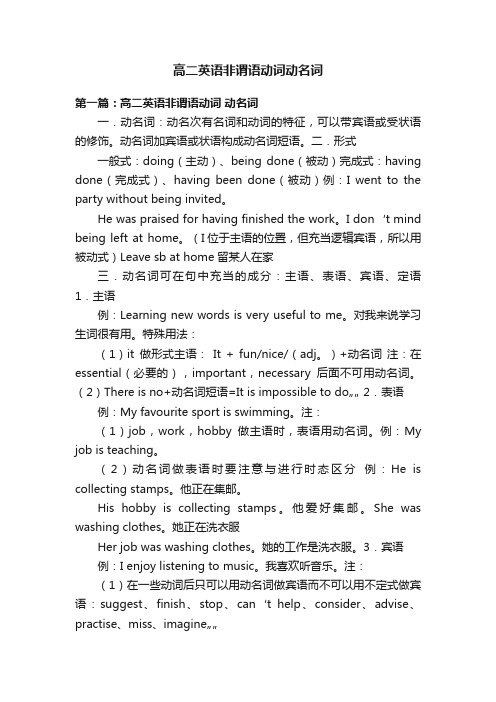
高二英语非谓语动词动名词第一篇:高二英语非谓语动词动名词一.动名词:动名次有名词和动词的特征,可以带宾语或受状语的修饰。
动名词加宾语或状语构成动名词短语。
二.形式一般式:doing(主动)、being done(被动)完成式:having done(完成式)、having been done(被动)例:I went to the party without being invited。
He was praised for having finished the work。
I don‘t mind being left at home。
(I位于主语的位置,但充当逻辑宾语,所以用被动式)Leave sb at home留某人在家三.动名词可在句中充当的成分:主语、表语、宾语、定语1.主语例:Learning new words is very useful to me。
对我来说学习生词很有用。
特殊用法:(1)it做形式主语:It + fun/nice/(adj。
)+动名词注:在essential(必要的),important,necessary后面不可用动名词。
(2)There is no+动名词短语=It is impossible to do…… 2.表语例:My favourite sport is swimming。
注:(1)job,work,hobby做主语时,表语用动名词。
例:My job is teaching。
(2)动名词做表语时要注意与进行时态区分例:He is collecting stamps。
他正在集邮。
His hobby is collecting stamps。
他爱好集邮。
She was washing clothes。
她正在洗衣服Her job was washing clothes。
她的工作是洗衣服。
3.宾语例:I enjoy listening to music。
我喜欢听音乐。
非谓语动词-动名词知识点总结
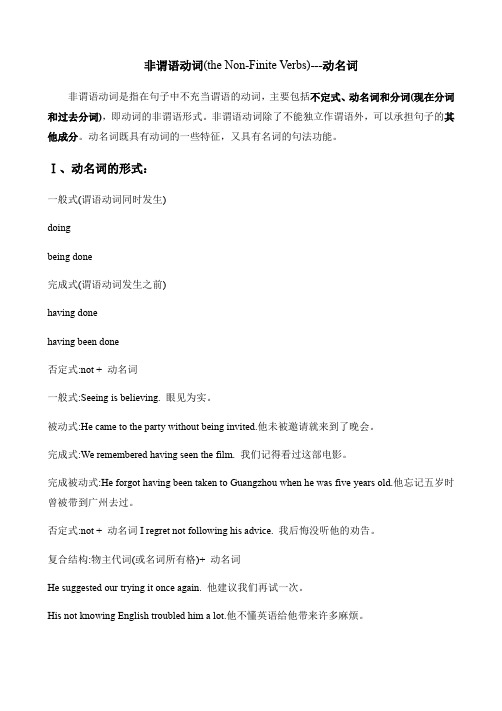
非谓语动词(the Non-Finite Verbs)---动名词非谓语动词是指在句子中不充当谓语的动词,主要包括不定式、动名词和分词(现在分词和过去分词),即动词的非谓语形式。
非谓语动词除了不能独立作谓语外,可以承担句子的其他成分。
动名词既具有动词的一些特征,又具有名词的句法功能。
Ⅰ、动名词的形式:一般式(谓语动词同时发生)doingbeing done完成式(谓语动词发生之前)having donehaving been done否定式:not + 动名词一般式:Seeing is believing. 眼见为实。
被动式:He came to the party without being invited.他未被邀请就来到了晚会。
完成式:We remembered having seen the film. 我们记得看过这部电影。
完成被动式:He forgot having been taken to Guangzhou when he was five years old.他忘记五岁时曾被带到广州去过。
否定式:not + 动名词I regret not following his advice. 我后悔没听他的劝告。
复合结构:物主代词(或名词所有格)+ 动名词He suggested our trying it once again. 他建议我们再试一次。
His not knowing English troubled him a lot.他不懂英语给他带来许多麻烦。
Ⅱ、动名词的句法功能:一、作主语:Reading aloud is very helpful. 朗读是很有好处的。
Collecting stamps is interesting. 集邮很有趣。
当动名词短语作主语时常用it作形式主语。
It's no use quarreling.争吵是没用的。
二、作表语:In the ant city,the queen's job is laying eggs.在蚂蚁王国,蚁后的工作是产卵。
非谓语动词用法精讲动名词的用法及注意事项
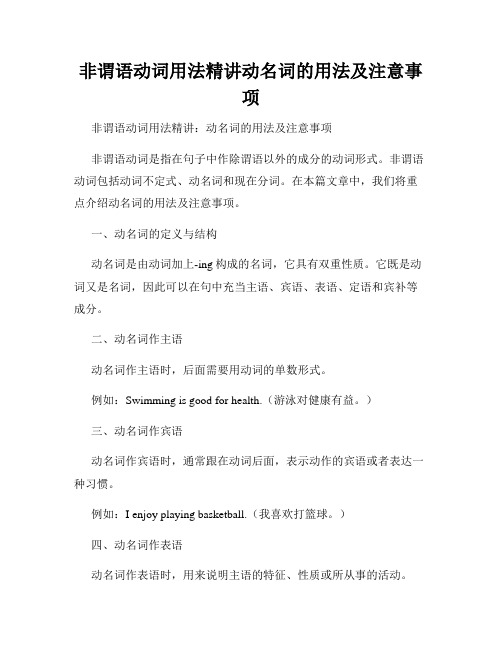
非谓语动词用法精讲动名词的用法及注意事项非谓语动词用法精讲:动名词的用法及注意事项非谓语动词是指在句子中作除谓语以外的成分的动词形式。
非谓语动词包括动词不定式、动名词和现在分词。
在本篇文章中,我们将重点介绍动名词的用法及注意事项。
一、动名词的定义与结构动名词是由动词加上-ing构成的名词,它具有双重性质。
它既是动词又是名词,因此可以在句中充当主语、宾语、表语、定语和宾补等成分。
二、动名词作主语动名词作主语时,后面需要用动词的单数形式。
例如:Swimming is good for health.(游泳对健康有益。
)三、动名词作宾语动名词作宾语时,通常跟在动词后面,表示动作的宾语或者表达一种习惯。
例如:I enjoy playing basketball.(我喜欢打篮球。
)四、动名词作表语动名词作表语时,用来说明主语的特征、性质或所从事的活动。
例如:Her hobby is reading books.(她的爱好是读书。
)五、动名词作定语动名词作定语时,修饰名词,表示名词的用途、功能等。
例如:I bought a writing pen.(我买了一支书写用的钢笔。
)六、动名词作宾补有些动词后接动名词作宾补,表示被动或完成的意义。
例如:He kept me waiting for a long time.(他让我等了很久。
)七、动名词的注意事项1. 与介词to连用:有些动词后接动名词时需要在两者之间加上介词to,表示目的或作用。
例如:He is looking forward to seeing you.(他期待着见到你。
)2. 与不定式的区别:有些动词后既可接动名词又可接不定式,但含义上有所区别。
例如:I enjoy playing soccer.(我喜欢踢足球。
)I want to play soccer.(我想要踢足球。
)3. 直接加名词所有格:有些动词后接动名词作宾语时,可以直接加名词所有格,表示所属关系。
非谓语动词之动名词

非谓语动词之动名词一、动名词作主语1.一般置于句首:Reading English is easier than speaking it.2.有时也可以用it作形式主语,而把动名词放在谓语动词之后。
It will be nice seeing them again.这类句子结构常见的还有:1)It’s no use…;It is no use crying over spilt milk.2)It's no good…;It is no good feeling self——satisfied over your first success.3)Is it any good…?Is it any good trying to exp1ain?4)It's a waste of time…;It's a waste of time arguing about it.3.动名词还可以在There is no…句子结构中做主语:There is no asking him to come now.He is busy.这种句子中的动名词常带有宾语,其句型含义相当于It is impossible to do…二、动名词作表语连系动词常与动名词连用,一起构成复合谓语:Our task is building China into a powerfu1 modern socialist country.三、动名词作宾语1.作动词宾语:This factory has stopped producing the old type of engine.必须接动名词作宾语的动词常见的有:consider,delay,dislike,enjoy,excuse,finish,give up,cannot help(禁不住),imagine,mind,miss,practise,put off,resist,suggest,pardon,stop,allow,permit,forbid,appreciate等。
抢分法宝 06 非谓语动词之动名词(解析版)

秘籍06 非谓语动词之动名词名目动名词【高考猜测】动名词概率猜测+题型猜测+考向猜测 (01)【思维导图】动名词考点考向思维导图 (02)【应试秘籍】动名词的区分、常考点及应对的策略 (03)【误区点拨】动名词点拨常见的易错点 (03)【抢分通关】动名词题押题新高考方向,讲解通关策略(含新考法) (08)概率猜测☆☆☆☆☆题型猜测语法填空题、阅读理解句意、写作高级句式输出考向猜测动名词作主语、作宾语、作表语、作定语动名词和现在分词都是动词加-ing,但是功能却有所不同。
动名词就是名词,保留了一些动词的某些特征,具有动词的某些变化形式,用以表达名词所不能表达的较为简单的意思。
在句中可以作主语、宾语、表语、定语,可以被副词修饰或者来支配宾语。
现在分词更侧重在动词的特征上。
现在分词可以作宾语补足语、表语、定语和状语。
一动名词作主语动名词作主语,表示一种概念、习惯或阅历,主语太长时,常用it作形式主语,动名词置于句尾。
在备考中应当牢记常考句型。
易错点:it充当形式主语时,不定式和动名词错用秘籍:牢记常用动名词作主语的习惯句型。
不定式充当真正的主语句型布告形式的省略句To my joy, (listen) to each book made me feel like watching a movie, but better because books gave much more details than movies.破解:考查非谓语动词。
分析句子结构可知,句中缺少主语,所以用动名词作主语。
故填listening。
句意:让我兴奋的是,每听一本书都让我感觉像在看电影,但更好,由于书比电影供应了更多的细节。
变式1:There is no denying that (equip) with global vision and the spirit of innovation is significant to China’s young generations.破解:分析句子结构,从句中缺主语,故用动名词短语作主语。
非谓语动词之动名词

非谓语动词之动名词在英语中,不能单独作谓语而具有除谓语动词以外的语法功能的动词叫非谓语动词。
非谓语动词分:动名词、动词不定式、分词(现在/过去分词)。
非谓语动词的否定式是在非谓语动词前直接加not。
动名词既具有动词的特征,又具有名词的句法功能。
其形式是:doing;否定式是:not doing。
(一)、动名词的形式:(1)一般式:Seeing is believing.(2)被动式:He came to the party without being invited.(3)完成式:We remembered having seen the film.(4)完成被动式:He forgot having been taken to Guangzhou when he was five years old.(5)否定式(not + 动名词):I regret not following his advice.,(二)、动名词的句法功能:(1)作主语:Reading aloud is very helpful.Collecting stamps is interesting.当动名词短语作主语时常用it作形式主语。
如:It's no use/no good/not any good/not any use/useless/a waste of time/fun quarrelling.It’s no use reading the book.a, ------ What made him so unhappy------ the ticket for the football match.A. Having been lostB. LostC. Because of losingD. Losingb. Being exposed to sunlight for too much time will do harm to one’s skin.\(2)作宾语:We have to prevent the air from being polluted.注意:动名词既可作动词宾语也可作介词宾语。
非谓语动词-动名词

Nodding the head means agreement. 点头 表示同意。
Reading English in the morning will bring benefits to you.
早晨朗读英文会给你带来许多好处。
Little Tom likes watching cartoon. 小汤姆爱看动画片。
完成式:表示动名词的动作发生在谓语动作之前
I regret having taken her advice. 我后悔 采纳了她的建议。
He was praised for having made a great progress. 由于取得很大的进步,他受到了表扬。
眼见为实。
2. (动名词和不定式作主语,一般都可以使用形式 主语 it,而将动名词或不定式放在句尾。) 下列句型中,宜用动名词作真正主语: It’s no use /good doing … It’s a waste of time doing …
而在 It’s important/necessary to do sth 这类句型 中,只能用不定式作真正主语:
To play with fire will be dangerous. 玩火是危险的。
下列几种情况中不能互换:
1. 主语和表语的形式须一致
(当表语是动名词时,主语也要用动名词; 当表语是不定式时,主语也要用不定式)
Seeing is believing. To see is to believe.
他忙于准备功课。
注:
有些动词后面,既可跟动名词也可跟不定 式作宾语,但意义不同。
doing 记得曾经做过... remember
高中英语非谓语动词精讲精练—动名词

高中英语非谓语动词精讲精练—动名词定义:动名词是一种兼有动词和名词特征的非限定动词。
它可以支配宾语,也能被副词修饰。
动名词有时态和语态的变化。
解释:动词的ing形式如果是名词,这个词称动名词。
特征:动词原形+ing构成,具有名词,动词一些特征一、动名词的作用:动名词具有名词的性质,因此在句中可以作主语、表语、宾语、定语等。
二、动名词的时态和语态:1.动名词作主语Learning without practice is no good. 学而不实践是没好处的。
Swimming develops the muscles. 游泳可以发展肌肉。
Smoking may cause cancer. 吸烟可能导致癌症。
Working in these conditions is not a pleasure but a suffer.在这种条件下工作不是一件愉快的事而是一件痛苦的事。
Breathing became difficult at that altitude. 在那个海拔高度呼吸变得很困难。
Reading is for sure learning, but applying is also learning to a greater extent.读书当然是学习,然而运用在很大程度上更是学习。
动名词作主语时,通常为了避免主语过于冗长,常用it 作形式主语。
如:①It’s +no good(no use, fun, a pleasure, a waste of time)+doing…It’s no good reading in dim light.It’s no use sitting here waiting.It’s no use arguing with him. 跟他争论没用。
②It’s+形容词+doingIt’s dangerous swimming in the sea in windy days.It is dangerous using this method to measure the speed of light.用这种方法去测量光速是危险的。
非谓语--动名词(已整理)
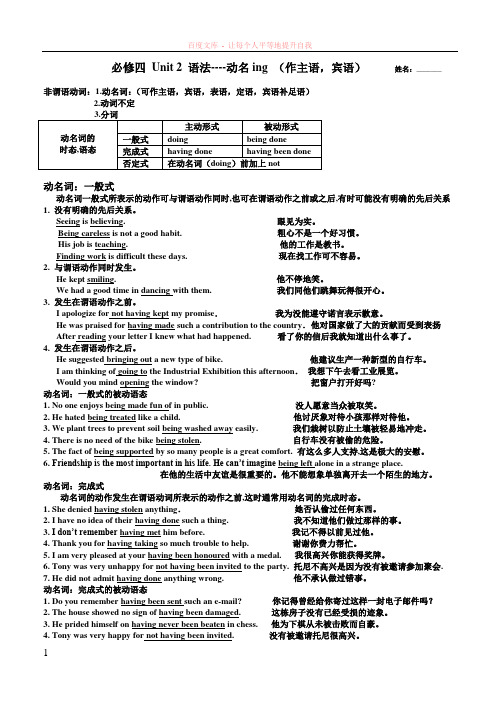
必修四Unit 2 语法----动名ing (作主语,宾语)姓名:_______非谓语动词:1.动名词:(可作主语,宾语,表语,定语,宾语补足语)2.动词不定3.分词动名词的时态,语态主动形式被动形式一般式doing being done完成式having done having been done 否定式在动名词(doing)前加上not动名词:一般式动名词一般式所表示的动作可与谓语动作同时,也可在谓语动作之前或之后,有时可能没有明确的先后关系1. 没有明确的先后关系。
Seeing is believing. 眼见为实。
Being careless is not a good habit. 粗心不是一个好习惯。
His job is teaching. 他的工作是教书。
Finding work is difficult these days. 现在找工作可不容易。
2. 与谓语动作同时发生。
He kept smiling. 他不停地笑。
We had a good time in dancing with them. 我们同他们跳舞玩得很开心。
3. 发生在谓语动作之前。
I apologize for not having kept my promise.我为没能遵守诺言表示歉意。
He was praised for having made such a contribution to the country.他对国家做了大的贡献而受到表扬After reading your letter I knew what had happened. 看了你的信后我就知道出什么事了。
4. 发生在谓语动作之后。
He suggested bringing out a new type of bike. 他建议生产一种新型的自行车。
I am thinking of going to the Industrial Exhibition this afternoon.我想下午去看工业展览。
非谓语动词语法:动名词的用法

非谓语动词语法:动名词的用法在英语语法中,动名词是一种非谓语动词形式,它具有动词和名词的特点。
动名词以-ing结尾,并且可以作为名词使用,用于表达一种动作、状态或感受。
本文将介绍动名词的用法及相关注意事项。
1. 动名词作主语动名词可以作为句子的主语,通常位于句首。
例如:•Running is good for your health.(跑步对健康有好处。
)•Swimming is my favorite sport.(游泳是我最喜欢的运动。
)2. 动名词作宾语动名词可以作及物动词的宾语。
例如:•I enjoy playing basketball.(我喜欢打篮球。
)•She admitted stealing money.(她承认偷了钱。
)需要注意的是,某些动词后面既可以接动名词,也可以接不定式。
例如,下面的动词可以接动名词或不定式作宾语:•想要(want)•喜欢(like)•开始(start)•继续(continue)•停止(stop)•完成(finish)动名词作宾语时,可以加上介词to,以表示目的或意图。
例如:•He is looking forward to meeting his friends.(他期待着见到他的朋友。
)•I am used to waking up early.(我习惯早起。
)3. 动名词作定语动名词可以作为名词的定语,用于修饰名词。
例如:•The running water is very clear.(流动的水非常清澈。
)•I need a writing pen.(我需要一支写字的笔。
)4. 动名词作表语动名词可以作为动词be的表语。
例如:•His favorite activity is playing guitar.(他最喜欢的活动是弹吉他。
)5. 动名词作宾语补足语动名词可以作为及物动词的宾语补足语,用于补充说明主语的动作。
例如:•I found him reading a book in the library.(我在图书馆发现他在读书。
非谓语动词之动名词
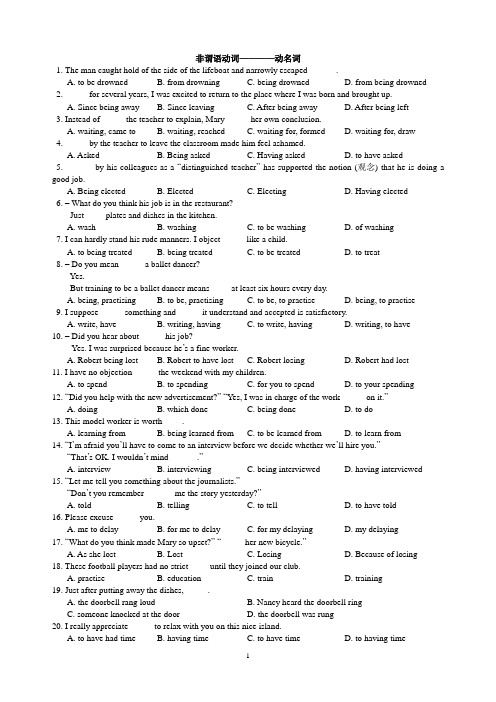
非谓语动词————动名词1. The man caught hold of the side of the lifeboat and narrowly escaped ______.A. to be drownedB. from drowningC. being drownedD. from being drowned2. _____ for several years, I was excited to return to the place where I was born and brought up.A. Since being awayB. Since leavingC. After being awayD. After being left3. Instead of _____ the teacher to explain, Mary _____ her own conclusion.A. waiting, came toB. waiting, reachedC. waiting for, formedD. waiting for, draw4. _____ by the teacher to leave the classroom made him feel ashamed.A. AskedB. Being askedC. Having askedD. to have asked5. ______ by his colleagues as a “distinguished teacher” has supported the notion (观念) that he is doing a good job.A. Being electedB. ElectedC. ElectingD. Having elected6. – What do you think his job is in the restaurant?- Just ____ plates and dishes in the kitchen.A. washB. washingC. to be washingD. of washing7. I can hardly stand his rude manners. I object _____ like a child.A. to being treatedB. being treatedC. to be treatedD. to treat8. – Do you mean _____ a ballet dancer?- Yes.- But training to be a ballet dancer means ____ at least six hours every day.A. being, practisingB. to be, practisingC. to be, to practiseD. being, to practise9. I suppose _____ something and _____ it understand and accepted is satisfactory.A. write, haveB. writing, havingC. to write, havingD. writing, to have10. – Did you hear about _____ his job?- Yes. I was surprised because he’s a fine worker.A. Robert being lostB. Robert to have lostC. Robert losingD. Robert had lost11. I have no objection _____ the weekend with my children.A. to spendB. to spendingC. for you to spendD. to your spending12. “Did you help with the new advertisement?”“Yes, I was in charge of the work _____ on it.”A. doingB. which doneC. being doneD. to do13. This model worker is worth ____.A. learning fromB. being learned fromC. to be learned fromD. to learn from14. “I’m afraid you’ll have to come to an interview before we decide whether we’ll hire you.”“That’s OK. I wouldn’t mind ______.”A. interviewB. interviewingC. being interviewedD. having interviewed15. “Let me tell you something about the journalists.”“Don’t you remember ______ me the story yesterday?”A. toldB. tellingC. to tellD. to have told16. Please excuse _____ you.A. me to delayB. for me to delayC. for my delayingD. my delaying17. “What do you think made Mary so upset?”“_____ her new bicycle.”A. As she lostB. LostC. LosingD. Because of losing18. These football players had no strict ____ until they joined our club.A. practiseB. educationC. trainD. training19. Just after putting away the dishes, _____.A. the doorbell rang loudB. Nancy heard the doorbell ringC. someone knocked at the doorD. the doorbell was rung20. I really appreciate _____ to relax with you on this nice island.A. to have had timeB. having timeC. to have timeD. to having time21. _____ to sunlight for too much time will do harm to one’s skin.A. ExposedB. Having exposedC. Being exposedD. After being exposed22. I don’t think the play is worth _____.A. to seeB. seeingC. to be seenD. being seen23. Mr. Reed made up his mind to devote all he had to ____ some schools for poor children.A. set upB. setting upC. have set upD. having set up24. “I usually go there by train.”“Why not _____ by boat for a change?”A. to try goingB. trying to goC. to try and goD. try going25. I would appreciate ____ back this afternoon.A. you to callB. you callC. your callingD. you’re calling26. While shopping, people sometimes can’t help ____ into buying something they don’t really need.A. to persuadeB. persuadingC. being persuadedD. be persuaded27. How about the two of us _____ a walk down the garden?A. to takeB. takeC. takingD. to be taking28. “I must apologize for ____ ahead of time.”“That’s all right.”A. letting you not knowB. not letting you knowC. letting you know notD. letting not you know29. She looks forward every spring to _____ the flower-lined garden.A. visitB. paying a visitC. walk inD. walking in30. Once your business becomes international, ______ constantly will be part of your life.A. you flyB. your flightC. flightD. flying31. “The old lady has been sad since her husband died.”“Yes, she needs _____.”A. being comfortedB. comfortingC. be comfortedD. to comfort32. They didn’t like him at first, but they ended up ____ the praises of him.A. to singB. singingC. and sangD. sung33. Some movie stars are always wearing sunglasses, afraid of ______.A. recognizing some fansB. being recognizedC. having been recognizedD. having recognized34. You can hardly imagine Bob ____ the housework by himself.A. doB. have doneC. to doD. doing35. The new computer leads to _____ a lot of people and labour. It’s a ____ machine.A. save, labour-savingB. saving, labour-savedC. saving, labour-savingD. save, labour-saved36. What made me puzzled was _____ to Jiao Tong University.A. her being not admittedB. being her not admittedC. her not being admittedD. having not been admitted37. What about _____ to the Summer Palace ____ the weekend.A. to go, forB. to go, atC. going, forD. going at38. Can you imagine the best boy in the class ______ in the examination?A. CheatingB. to cheatC. cheatD. to have cheated39. They say _____ is no use _______ over spilt milk.A. that, to cryB. it, to cryC. that, cryingD. it, crying40. Do you remember ______ to professor Smith during your last visit?A. to be introducedB. being introducedC. having introducedD. to have introduced41. The manager of the company said they should have prevented such silly mistakes ______.A. occurringB. being occurredC. to occurD. from being occurred42. _______ is worth doing at all is worth doing well.A. ThatB. WhichC. WhateverD. If43. We were delighted to find the trees planted a year before _____ very tall.A. grownB. being grownC. to have been growingD. growing44. She didn’t mind _____ all her spare time to _____ the sick old woman.A. to give, helpB. to give, helpingC. giving, helpD. giving, helping45. Your door needs _____. Would you like me to do it for you?A. to paintB. paintingC. paintD. to be painting46. It’s no use _____ me at the office this week because I’m ________.A. to ring, on my leaveB. to ring, at leaveC. ringing, in holidaysD. ringing, on holiday47. On hearing the _____ result, all the teachers of Class Six couldn’t help _____.A. satisfied, to jumpB. satisfactory, to jumpC. satisfied, jumpingD. satisfactory, jumping48. What I really mean is the noise of ______.A. the desks being opened and shutB. the desks’ being opened and shutC. the desks opening and shuttingD. the desks’ opening and shutting49. Why not try _____ in more sugar – that might make the soup taste a bit better?A. putB. to putC. puttingD. being put50. The farmer who admitted _____ the tiger was severely punished.A. to killB. killingC. killedD. to have killed51. _____ the sad news, she burst out ______.A. On, cryingB. At, cryingC. At, tearsD. On, tears52. His hesitation means _____ the chance.A. to give upB. giving upC. to give inD. giving in53. _____ president for so long, it was an unpleasant thought that he would have to take a back seat.A. After beingB. BeingC. To have beenD. Not being54. Do you remember _____ to Mr. Green during your last visit?A. to be introducedB. being introducedC. to introduceD. having introduced55. I realized we should do something to avoid _____ to death.A. freezingB. to freezeC. to be frozenD. being frozen56. You may have been right when you said I didn’t have to help him. But I don’t regret ___ what I thought was right.A. having to doB. being doneC. to doD. to have done57. Soon I got used _____ at seven in the morning.A. to riseB. to have risenC. to risingD. to be rising58. Excuse _____ you, but I have an important message for you.A. me to interruptB. for my being interruptedC. my interruptingD. me of interrupting59. She used to _____ a girl used to ____ jokes.A. be, makeB. be, makingC. being, makingD. being , tell60. No one likes _____ at in public.A. a laughingB. to laughC. laughedD. being laughed61. Mike doesn’t regret ____ even if it might have upset her.A. to tell her what he thoughtB. to tell her that he thoughtC. telling her what he thoughtD. telling her that he thought62. Do you think his hesitation means ______ an underwater tunnel here?A. giving up buildingB. to give up buildingC. giving up to buildD. to give up to build63. There is no risk ______ when your boat is upset if you learn to swim.A. of your being drownedB. for you to be drownedC. that you will be drownedD. at you being drowned64. The idea of fighting a noise ____ more noise wounds strange, but that’s exactly what some scientists are doing.A. to makeB. for makingC. only to makeD. by making65. Doctors say that ____ to sunlight for a long time is harmful to one’s skin.A. exposedB. exposingC. being exposedD. to expose66. A man can never accomplish if he always puts off _____ a decision.A. to makeB. makingC. in makingD. till making67. I regretted _____ my son for the mistake, for I later found that it was my own fault.A. to blameB. blamingC. blamedD. being to blame68. The whole family objected _____ a Japanese.A. Jane to marryB. that Jane should marryC. to Jane’s marryingD. Jane from marrying69. Having lived in France for many years, they still enjoyed the foods ____ in their homeland.A. which were used to havingB. they were used to havingC. which used to haveD. they were used to have70. ______ the next morning upset his parents very much.A. His being operated onB. Her would be operated onC. Him to be operated onD. The fact that he be operated on71. They couldn’t stand _____ by the host at the party.A. to be neglectedB. being neglectedC. neglectedD. that they were neglected72. A heavy smoker is usually unaware of the damage _____ to his body while he continues to smoke.A. having been doneB. to have been doneC. to be doingD. being done73. I can hardly imagine Kate _____ so difficult a job in three days.A. doingB. to do c. to have done D. has done74. The news of victory _____ in.A. keep pouringB. keep to pourC. keeps pouringD. keeps poured75. He ______ to bed early, but now he ______ to bed late.A. used to go, is used to goingB. used to go, is used to goC. uses to go, is used to goD. uses to go, is used to going76. It is no use _____ a lot without doing anything.A. talkB. talking c. to talk D. to talking77. I can hardly imagine Victor _____ across the Atlantic Ocean in five days.A. sailB. to sail B. sailing D. to have sailed78. They dare not tell the truth, for they are afraid _____.A. to be laughedB. of laughing atC. of being laughed atD. being laughed at79. Only ____ students in Senior Three can _____ so much time traveling.A. very few, takeB. a few, spareC. few, findD. few, spend80. The rocks brought from the moon are ______.A. worth to studyB. worthy of being studiedC. worthy of studyingD. worth being studied81. I need ______ a cleaner. The room needs ______.A. to get, to cleanB. get, to be cleanedC. getting, cleaningD. to get, cleaning82. Don’t you still remember _____ him once when you were in Paris?A. having metB. to have metC. to meetD. had met83. My uncle _____ live in the north, but he _____ the hot weather in the south now.A. used to, is used toB. used to, used toC. was used to, is used toD. was used to, used to84. His stomach began to _____ because of the bad food he had eaten.A. painB. acheC. be hurtD. go bad85. “What made his mother angry?”“____________.”A. Because he had lost the ticketB. Because of his having lost the ticketC. As he had lost the ticketD. Having lost the ticket86. He kept _____ how things were going on in the earthquake areas.A. informed us ofB. informing us ofC. us informing ofD. informing on87. That’s one of those questions that really don’t need _____.A. to answerB. answerC. answeringD. being answered88. Have you got used to ______ in a quiet place?A. to live aloneB. live aloneC. living aloneD. lived alone89. Without _____, the boy was hit by a third bullet and fell from the tree, dead.A. able to finish his wordsB. abling to finish his wordsC. being able to finish his wordsD. being able finished his words90. the children are fond of _____ to the New Year party, and they don’t mind ____ there till midnight.A. inviting, keepingB. invite, keepC. be invited, stayD. being invited, being kept91. Her suggestion is worth ____ seriously.A. consideringB. being consideredC. to considerD. of considering92. Did you have difficulty _____ the professor’s house in the dark?A. to findB. findingC. by findingD. to have found93. It is no use ____ any more since you have made the decision.A. to discussB. to be discussedC. discussingD. for discussion94. Trying without success is better than _____ at all.A. not to tryB. to not tryC. not tryingD. trying not95. The milk is too cold. It requires ______.A. to heatB. heatingC. to be hotD. being heated96. _________ the work in that way would cost much more time and money.A. If doingB. DoC. To be doingD. Doing97. Do you object _____ Japanese as a second foreign language?A. to my choosingB. for me to chooseC. that I chooseD. that I should choose98. Anyone who does a crime won’t _____.A. escape to be punishedB. be escaped punishingC. be escaped to punishD. escape being punished99. _____ as the top student on her campus made her parents very happy.A. Jane was chosenB. Jane’s being chosenC. Jane chosenD. Jane to be chosen 100. The murderer was sentenced to death even though he had admitted _____ the small boy.A. killingB. to have killedC. to killD. by having killing 101. We are looking forward to ______ you at our party, but we wouldn’t mind ____ soon if you have to.A. have, you to leaveB. having, your leavingC. have, your leavingD. having, your being left 102. We don’t allow ______ in the school.A. smokingB. to smokeC. they smokingD. anyone smoked103. Bethune never stopped ___ to save our wounded soldiers ____ he died at his post on November 12, 1939.A. working, untilB. to work, untilC. working, not untilD. to work, not until 104. He set about _____ the experiment last month and succeeded _____ a good result.A. doing, in gettingB. doing, to getC. to do, in gettingD. to do, to get105. I can’t _____ feeling angry about it.A. beB. helpC. sayD. do106. What about ____ a drink in that inn?A. havingB. to haveC. haveD. to having107. They went on _____ football all afternoon.A. playsB. playedC. playD. playing108. He was busy _______ his lessons.A. prepareB. to prepareC. preparingD. prepared109. He is _____ an artist.A. on the way to becomeB. on the way to becomingC. on way to becomeD. on the way become 110. He succeeded ______ everyone laugh.A. in makingB. to makeC. for makingD. in make111. Your window wants _____, you’d better have it _____ this week.A. cleaning, doB. to be cleaned, doC. cleaning, doneD. being cleaned, done 112. I’ll never forget _____ you for the first time.A. to meetB. meetingC. to have metD. having to be meeting 113. Tired of the cold weather in New England, Mr. And Mrs. Smith are considering _____ to the south.A. to moveB. movingC. moveD. to be moving114. ______ the Victoria Line with other lines of ten caused great problems.A. ConnectB. ConnectingC. ConnectedD. Connection115. The _____ video games all day made his mother very angry.A. child’s playingB. child playingC. child’s playD. child play116. These days he is busy ____ a job but no job _____ him.A. finding, suitB. look for, suitC. finding, is suitable toD. looking for, suits 117. The old nurse devoted herself ______ the patients.A. to look afterB. to looking afterC. in looking afterD. for looking after 118. The house needs _____ before we move in.A. to cleanB. being cleanedC. cleanedD. cleaning119. If you miss _____ for a couple of hours, no harm _____ to you.A. sleeping, will doB. to sleep, will be doneC. to sleep, will doD. sleeping, will be done 120. She didn’t mind _____ all her spare time to _____ the sick old lady.A. to give, helpB. to give, helpingC. giving, helpD. giving, helping 121. How much time does he spend ____ piano every day?A. practising playingB. to practise playing theC. practising playing theD. to practise playing 122. I am sure all of us have had experience of _____ when we are worried about something.A. staying wakingB. remaining wakeningC. staying awakeD. remaining awakened 123. I meant to have a look at books in stock, but at last I _____ a number of reference books.A. ended up buyingB. finished withC. ended with getting upD. finished off124. ______ a supermarket near our school is a great advantage.A. There beingB. There to beC. BeingD. There is125. He suggested _____ to Beijing by plane and _____ without a word.A. going, leftB. to go, to leaveC. going, leavingD. go, left126. He walked into the library on tiptoe, afraid _____ the others.A. of disturbingB. to disturbC. for disturbingD. about disturbing 127. Scanning before you read means _____ quickly and thoroughly.A. to look a passageB. looking a passageC. to look over a passageD. looking over a passage 128. Last night the policemen caught a thief _____ Wang’s car.A. when stealingB. that he stoleC. when stolenD. stealing129. The discovery of new evidence led to _______.A. the thief having caughtB. catch the thiefC. the thief being caughtD. the thief to be caught130. At that time she was so angry that she felt like ______ something at him.A. to throwB. throwingC. to have thrownD. having thrown131. ______ the meeting himself gave them a great deal of encouragement.A. The mayor will attendB. The mayor to attendC. The mayor is attendingD. The mayor’s attending 132. Mark often attempts to escape _____ whenever he breaks traffic regulations.A. having been finedB. to finedC. to have been finedD. being fined133. The old man caught a thief _____ Mike’s bike.A. to stealB. stealingC. steelingD. steal134. Wind can send a junk(帆船) ______.A. sailingB. to sailC. sailD. sailed135. Fancy his _____ like that.A. talkingB. to talkC. talkD. talked1. CCCBA 6. BABBC 11. DCACB 16. DCDBB 21. CBBDC 26. CCBDD 31. BBBDC 36. CCADB 41. ACDDB 46. DDACB 51. BBABD 56. ACCBD 61. CAADC 66. BBCBA 71. BDACA 76. BCCDB 81. DAABD 86. BCCCD 91. ABCCB 96. DADBA 101. BAAAB 106. ADCBA 111. CBBBA 116. DBDDD 121. CCAAA 126. ADDCB 131.DDBAA。
最新初中英语非谓语动词1动名词动词不定式讲解-练习
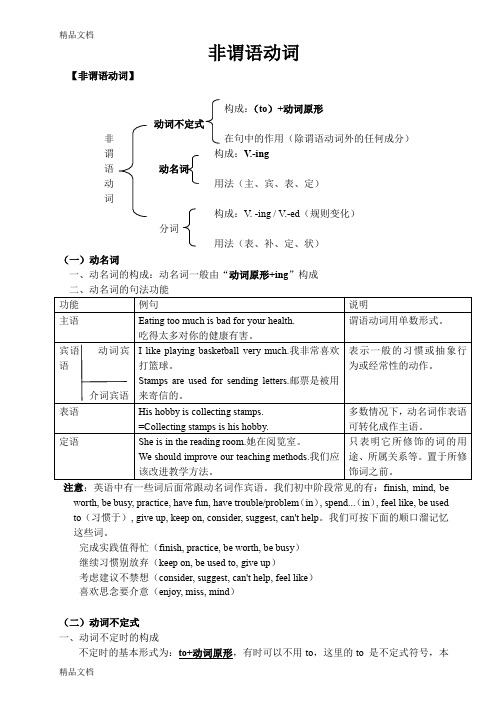
非谓语动词【非谓语动词】构成:(to)+动词原形动词不定式非在句中的作用(除谓语动词外的任何成分)谓构成:V.-ing语动名词动用法(主、宾、表、定)词构成:V. -ing / V.-ed(规则变化)分词用法(表、补、定、状)(一)动名词一、动名词的构成:动名词一般由“动词原形+ing”构成二、动名词的句法功能功能例句说明主语Eating too much is bad for your health.吃得太多对你的健康有害。
谓语动词用单数形式。
宾语动词宾语介词宾语I like playing basketball very much.我非常喜欢打篮球。
Stamps are used for sending letters.邮票是被用来寄信的。
表示一般的习惯或抽象行为或经常性的动作。
表语His hobby is collecting stamps.=Collecting stamps is his hobby. 多数情况下,动名词作表语可转化成作主语。
定语She is in the reading room.她在阅览室。
We should improve our teaching methods.我们应该改进教学方法。
只表明它所修饰的词的用途、所属关系等。
置于所修饰词之前。
注意:英语中有一些词后面常跟动名词作宾语。
我们初中阶段常见的有:finish, mind, be worth, be busy, practice, have fun, have trouble/problem(in), spend...(in), feel like, be used to(习惯于), give up, keep on, consider, suggest, can't help。
我们可按下面的顺口溜记忆这些词。
完成实践值得忙(finish, practice, be worth, be busy)继续习惯别放弃(keep on, be used to, give up)考虑建议不禁想(consider, suggest, can't help, feel like)喜欢思念要介意(enjoy, miss, mind)(二)动词不定式一、动词不定时的构成不定时的基本形式为:to+动词原形,有时可以不用to,这里的to 是不定式符号,本身无词义,动词不定式的否定形式是not+(to+)动词原形。
非谓语动词(动名词、动词不定式)总结及练习(附答案)

非谓语动词(动名词、动词不定式)总结及练习非谓语动词在句子中充当除了谓语....以外其它成份的动词形式,不受人称和数的限制。
在英语中,非谓语动词主要有动名词和动词不定式两种形式。
第一部分动名词1.0动名词是在动词后面+ ing (doing)的形式,把动词变成名词来使用。
比如:live → living, see → seeing, go → going,凡此种种。
2.0 动名词在句子中的成份2.1 动名词做主语e.g. Seeing is believing. seeing为动名词,在句子中做主语Learning Japanese is hard. 为动名词,在句子中做主语2.2 动名词作宾语, 此时多与一些固定的谓语动词作搭配, 见附表e.g. I like reading.He enjoyed living in France.2.3 动名词作介词的宾语,常常与类似如下短语的介词连用,如:dream of, keep awayfrom, be good at, be interested in …e.g. He is interested in drawing. 动名词drawing作in的宾语Please keep away from lying. 动名词lying作from的宾语2.4 动名词作表语e.g. Seeing is believing. 动名词believing作表语My hobby is skating. 动名词skating作表语2.5 动名词作定语, 对修饰的名词形成一种定义e.g. a dining room, a swimming pool, a waiting room…2.6 动名词作状语,逻辑主语须与主句主语报纸一致e.g. Hearing the good news, she couldn’t helping laughing. (时间状语)Having received the letter, I decided to write back. (时间状语)Having been to the Great Wall for many times, he didn’t go last week. (原因状语)Working hard, you will succeed.(条件状语)Though working hard from day to day, he didn’t get rich. (让步状语)2.7 动名词作宾语补足语,常与感官等动词连用e.g. I saw him leavingPlease keep him working.第二部分动词不定式1.0 动词不定式也是一种非谓语动词形式,其结构为“to+动词原形”,其中to不是介词而是动词不定式的符号,动词不定式没有人称和数的变化。
非谓语动词分项练习之动名词
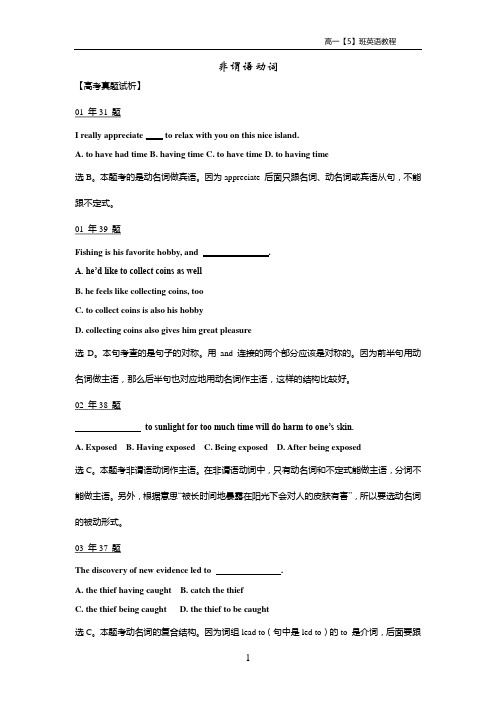
非谓语动词【高考真题试析】01 年31 题I really appreciate ____ to relax with you on this nice island.A. to have had timeB. having timeC. to have timeD. to having time选B。
本题考的是动名词做宾语。
因为appreciate 后面只跟名词、动名词或宾语从句,不能跟不定式。
01 年39 题Fishing is his favorite hobby, and .A. he’d like to collect coins as wellB. he feels like collecting coins, tooC. to collect coins is also his hobbyD. collecting coins also gives him great pleasure选D。
本句考查的是句子的对称。
用and 连接的两个部分应该是对称的。
因为前半句用动名词做主语,那么后半句也对应地用动名词作主语,这样的结构比较好。
02 年38 题to sunlight for too much time will do harm to one’s skin.A. ExposedB. Having exposedC. Being exposedD. After being exposed选C。
本题考非谓语动词作主语。
在非谓语动词中,只有动名词和不定式能做主语,分词不能做主语。
另外,根据意思“被长时间地暴露在阳光下会对人的皮肤有害”,所以要选动名词的被动形式。
03 年37 题The discovery of new evidence led to .A. the thief having caughtB. catch the thiefC. the thief being caughtD. the thief to be caught选C。
非谓语动词---动名词

动名词动名词是动词的另外一种非限定形式,通常由动词+-ing形式构成。
它具备动词的某些特点,有时态和语态上的变化,可以有自己的宾语或状语;也具备名词的特点,可以带冠词,被形容词、代词及名词所有格所修饰,在句中起名词的作用,单独或引起短语作主语,表语,宾语,或介词的宾语等。
一、动名词的形式和意义因为动名词具备动词的特征,所以它也有时态和语态上的变化。
以do为例:1. 动名词的一般式通常表示一般性动作(即不是明确地在过去、现在或将来发生的动作),或是表示与谓语所表示的动作同时发生的动作。
e.g. I) They are interested in climbing mountains.II) He took a great delight in helping others.2. 如果动名词所代表的动作在谓语所表示的动作之前发生,则通常用动名词的完成形式。
e.g. I) He de nied having peeked at his neighbor’s test paper. 他否认偷看了他同桌的考卷。
II) He was praised for having made such a contribution to the country.【注】在某些动词后或成语中,也常用动名词的一般形式表示在谓语动词所表示的动作之前所发生的动作。
e.g. I) I don’t remember ever seeing him anywhere.II) Thank you for giving us so much help.3. 当一个动名词逻辑上的主语所表示的是这动作的对象时,这动名词一般要用被动形式。
如果动名词所表示的动作在谓语表示的动作之前发生,有时还需用动名词的完成被动式。
e.g. I) He could not bear being made fun of like that. 人家这样开他的玩笑他受不了。
非谓语动词语法:动名词的用法
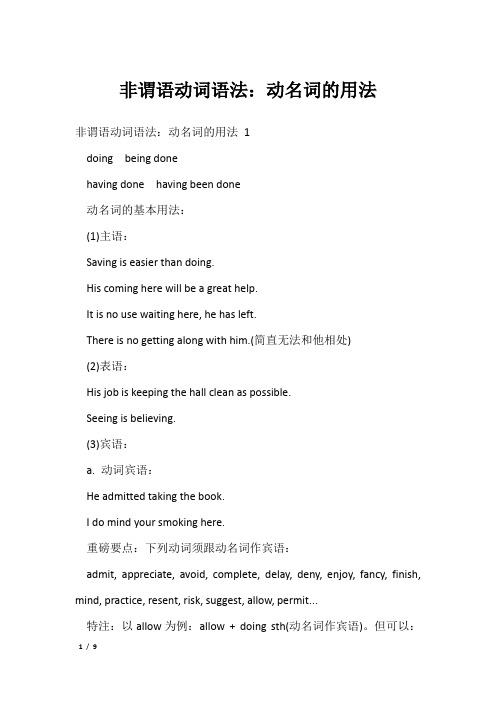
非谓语动词语法:动名词的用法非谓语动词语法:动名词的用法1doing being donehaving done having been done动名词的基本用法:(1)主语:Saving is easier than doing.His coming here will be a great help.It is no use waiting here, he has left.There is no getting along with him.(简直无法和他相处)(2)表语:His job is keeping the hall clean as possible.Seeing is believing.(3)宾语:a. 动词宾语:He admitted taking the book.I do mind your smoking here.重磅要点:下列动词须跟动名词作宾语:admit, appreciate, avoid, complete, delay, deny, enjoy, fancy, finish, mind, practice, resent, risk, suggest, allow, permit...特注:以allow为例:allow + doing sth(动名词作宾语)。
但可以:Allow sb to do sth(不定式作宾补)。
这类动词常见如advise, allow, permit, recommend, etc.b. 作介词宾语:He left without saying goodbye to us.Im looking forward to meeting you.(to 在这里是介词)(4)定语:reading room swimming pool walking stick动名词时态:I am thinking of setting a new dictionary.(以后)He never talked to me about his having been in Paris.(以前)动名词语态:He doesnt like being flattered.I heard of his having been chosen to be the coach of the team.动名词复合结构:由名词全部格或物主代词与动名词构成。
高中英语语法:非谓语动词之动名词
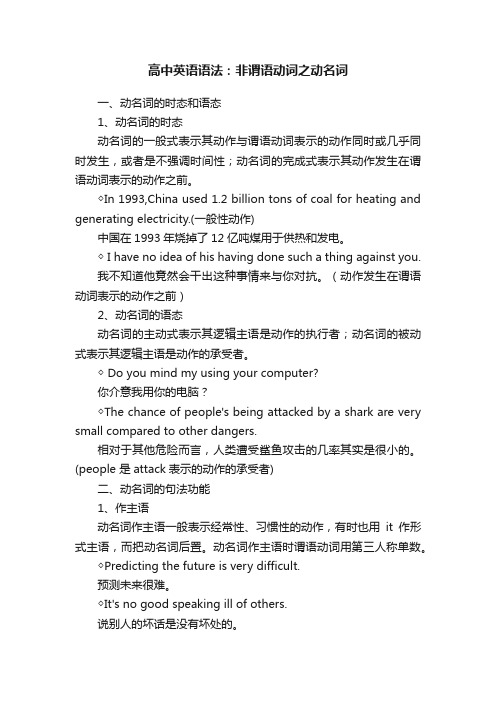
高中英语语法:非谓语动词之动名词一、动名词的时态和语态1、动名词的时态动名词的一般式表示其动作与谓语动词表示的动作同时或几乎同时发生,或者是不强调时间性;动名词的完成式表示其动作发生在谓语动词表示的动作之前。
◇In 1993,China used 1.2 billion tons of coal for heating and generating electricity.(一般性动作)中国在1993年烧掉了12亿吨煤用于供热和发电。
◇ I have no idea of his having done such a thing against you.我不知道他竟然会干出这种事情来与你对抗。
(动作发生在谓语动词表示的动作之前)2、动名词的语态动名词的主动式表示其逻辑主语是动作的执行者;动名词的被动式表示其逻辑主语是动作的承受者。
◇ Do you mind my using your computer?你介意我用你的电脑?◇The ch ance of people's being attacked by a shark are very small compared to other dangers.相对于其他危险而言,人类遭受鲨鱼攻击的几率其实是很小的。
(people 是attack表示的动作的承受者)二、动名词的句法功能1、作主语动名词作主语一般表示经常性、习惯性的动作,有时也用it作形式主语,而把动名词后置。
动名词作主语时谓语动词用第三人称单数。
◇Predicting the future is very difficul t.预测未来很难。
◇It's no good speaking ill of others.说别人的坏话是没有坏处的。
2、作宾语动名词一般充当介词的宾语,有些动词或短语动词只能接动名词作宾语。
◇Do you enjoy being a volunteer?你喜欢当志愿者吗?◇I look forward to receiving your letter soon.我盼望尽快收到你的来信。
非谓语动词——动名词

非谓语动词——动名词第十五讲:非谓语动词——动名词教学重点:掌握动名词这一语法知识。
了解这一语法知识在高考中的应用。
命题趋势:动名词的考点依次为作宾语,作主语,作定语,作表语。
一些固定的基本知识应记牢。
知识点回顾在句子中充当除谓语以外的句子成分的动词形式叫做非谓语动词。
非谓语动词分为三种形式:不定式,动名词,和分词(分词包括现在分词和过去分词)。
动名词1.动名词简述:动名词是三种非谓语动词的一种。
由动词+ing构成,与现在分词的形式相同。
动名词在句中可以作主语、宾语(介词宾语和动宾)和表语,还可以作定语。
同时,动名词仍然具有动词的若干特点,它可以有自己的宾语和状语。
2.动名词在句中所能充当的成分:动名词主语√宾语√表语√定语√状语补语2.1动名词作主语XXX空谈无济于事。
XXX XXX.眼见为实。
Having done the work is an XXX.做过这种工作,就会使你永生难忘。
留意:动名词作主语时,谓语动词一概用单数。
(详见上三例)2.1.1用It作方式主语用动名词作主语时,和动词不定式一样,有时也用It作形式主语。
It is no use (useless) talking too much。
= Talking too much is no use (useless).It is no good crying.= Crying is no good.It trains the XXX to music。
= Listening to music trains the ear.2.1.2在there be句型中只能用动名词作主语(不用不定式)There is no + ---ing.(…。
是不可能的)= It is XXX…。
= No one can…。
There XXX.= It is impossible to tell what will happen.= No one can tell what will happen.无法预言将会发生什么事情。
非谓语动词之动名词

动名词
在电影院看电影感觉很不错。 ________________________________ (Watching movies in the cinema feels really good.)
夏天在游泳池游泳很舒服。 ________________________________ (Swimming in the pool in summer is
每当你想要吸烟的时候,就提醒自己,你不再是吸 的人了。 Every time you feel like smoking a cigarette, remind yourself that you are a non-smoker. (人教6-3)
动名词
他们掌握了种植、狩猎和迁徙的新方法。 They developed new methods of growing food, hunting and moving around. (人教5-4)
他不还我钱让我感到很不舒服。 His not returning me money makes me mad.
我生气的是你不服从我的命令。 I'm mad at your not obeying my orders.
你知不知道他昨天离开了? Have you any idea his leaving yesterday?
It's good to see you. 很高兴见到你。
不定式
能认识你是我的荣幸。 要把一门外语学好不容易。 难说! 做这个家庭作业花了我3小时。 我们不帮他是个错误。
不定式
常见的只能接动名词作宾语的动词词组有:give up, insist on, feel like, get down to, look forward to, get used to, can't help等;
- 1、下载文档前请自行甄别文档内容的完整性,平台不提供额外的编辑、内容补充、找答案等附加服务。
- 2、"仅部分预览"的文档,不可在线预览部分如存在完整性等问题,可反馈申请退款(可完整预览的文档不适用该条件!)。
- 3、如文档侵犯您的权益,请联系客服反馈,我们会尽快为您处理(人工客服工作时间:9:00-18:30)。
非谓语动词分项练习之动名词1.We can't understand ______ a decision until it is too late.A. him to postpone to makeB. his postponing to makeC. him to postpone makingD. his postponing making2.It's no use______ with him. You might as well ______ with a stone wall.A. arguing, argueB. to argue, arguingC. arguing, arguingD. to argue, argue3.The old man's ______ pity on the snake led to his own death.A. takeB. takingC. being takenD. have4.It is no good ______ today's work for tomorrow.A. to leaveB. leavingC. that you leaveD. leave5.Some people's greatest pleasure is ______.A. fishingB. to fishC. to be fishD. being fishing6.You didn't hear us come back last night. That's good. We tried ______ noisy.A. to not beB. not to beC. being notD. not being7.You'll regret ______ those words. You may hurt her feelings.A. sayB. to sayC. sayingD. to have said8.You can keep the book until you ______.A. have finished readingB. finish to readC. will finish readingD. have finished to read9.I'd ______ the operation unless it is absolutely necessary.A. rather not haveB. rather not to haveC. not rather hadD. rather not having10.Your mother and I are looking forward________ you.A. of seeingB. for seeingC. to seeD. to seeing11.People couldn't help ______ the foolish girl.A. laugh atB. to laugh atC. laughing atD. laughing12.Remember ______ the book, when you have finished it.A. putting backB. having put backC. to put backD. will put back13.Have you forgotten ______ $1000 from me last month? Will you please remember ______ it tomorrow?A. borrowing; to bringB. to borrow; bringC. borrowed; bringingD. borrowing; bringing14.We are looking forward to ______ another chance ______ it again.A. be given, to tryB. have, to tryC. giving, tryingD. having, to try15.-- "I usually go there by train." -- " Why not ______ by boat for a change?"A. to try goingB. trying to goC. to try and goD. try going16.-- What do you think of the book?-- Oh. excellent, it's worth _______ a second time.A. to readB. to be readC. readingD. being read17.It is useless _____ to come now. He is busy.A. ask himB. to ask himC. that you ask himD. asking him18.The classroom wants _________.A. cleanB. cleanedC. to cleanD. cleaning19.Jack said that he wouldn't mind _________ for us.A. to waitB. waitC. waitingD. waited20.Keep on ________ and you will succeed.A.a tryB.tryC.triingD.trying21.-- What's made Ruth so upset?-- ____ three tickets to the folk music concert.A. LostB. LosingC. Because of losingD. Since she lost22.Only one of these books is _____.A. worth to readB. worth being readC. worth of readingD. worth reading23.He had no difficulty _____ the problems.A. working outB. having worked outC. to have worked outD. to work out24.Your flat needs _____ . Would you like me it for you?A. to clean, to doB. cleaning, doingC. cleaning, to doD. to be cleaned, doing25.________ clean is a safeguard against disease.A. To be keepingB. KeptC. KeepD. Keeping用非谓语动词翻译下列句子。
(注明该非谓语动词在句子充当什么成分)1.出声朗读是很有帮助的。
_________________________________________________________. 充当:_____ 2.晚上晚睡是没有好处的。
(It is no good…)_________________________________________________________. 充当:_____ 3.你为什么坚持要离开美国呢?_________________________________________________________. 充当:_____ 4.我正在考虑去阅览室。
_________________________________________________________. 充当:_____ 5.按时完成这项工程,我们一点困难也没有。
_________________________________________________________. 充当:_____ 6.在蚂蚁的世界里,蚁后的工作是产卵。
_________________________________________________________. 充当:_____ 7.爸爸不允许我吸烟。
(用动名词复合形式)_________________________________________________________. 充当:_____ 8.任何一个违反法律的人都逃不过惩罚。
_________________________________________________________. 充当:_____ 9.我无法想象玛丽嫁给了这样的男人。
_________________________________________________________. 充当:_____ 10.他无法否认昨天对老师撒谎了。
_________________________________________________________. 充当:_____DABBA BCAAD CCADD C DDCD B DACD1.Reading aloud is helpful. 主语2.It is no good staying up late at night. 主语3.Why did you insist on leaving America? 宾语4.I am considering going to the reading room. 宾语5.We have no difficulty (in) finishing the project in time. 宾语6.In the world of ants, the queens’ job is laying eggs. 表语7.Father doesn’t allow my smoking. 宾语8.Anyone who breaks the law c an’t escape being punished. 宾语9.I can’t imagine Mary’s (Mary) marrying to such a man. 宾语10.He can’t deny having told a lie to his teacher yesterday. 宾语非谓语动词(三)A卷1.Some students like staying up late into the night, ________ their lessons for the coming examination.A.to prepare B.preparingC.prepare D.was preparing2.These are the facts ______ by the school.A.to gather B.gathering C.gathered D.to be gathered3.He got his shoes ______ yesterday.A.to repair B.repairing C.being repaired D.repaired4.When I got home, there was ______, so I got angry.A.a little food to leave B.little food leftC.a little food leaving D.little food to leave5.I lived in a house ______ by a lot of pine trees.A.surrounding B.to surround C.surrounded D.to be surrounded6.The name of Nebraska comes from an Indian word, ______ flat water.A.to mean B.meaning C.it means D.by meaning7.Weather ______, we are going swimming.A.permitting B.to permit C.permitted D.having permitted8.It's a music group ______ itself Wolves.A.calls B.called C.is called D.calling9.The old lady has two sons, ______ in a big city.A.live B.to live C.lives D.living10.Among those ______ were some classmates of mine.A.invited B.inviting C.to invite D.having been invited11.Is there a student ______ Jack in your class?A.called B.calling C.to call D.calls12.So many people went to watch the football match, ______ some young girls.A.including B.inculded C.include D.to include13.I can't understand the letter ______ in English.A.written B.write C.writing D.have been written14.The people ______ another country needs passport.A.enters B.enter C.entered D.entering15.______ deep down in the earth for thousands of years, the dead forest has rotted away and become coal.A.Buried B.Burying C.Having buried D.Having been buried16.______ from the moon, the earth looks like a colorful ball.A.Seeing B.Seen C.Having seen D.Having been seen 17.The boy sat on the sofa, ______ TV programme attentively.A.watch B.watched C.watching D.to watch18.______ among high trees, the house can't easily be seen.A.Hidden B.Hid C.Hide D.Hiding19.______, Tom is loved by all the people in the village.A.Being an honest man B.Being that he is an honest manC.He is an honest man D.An honest man being20.Class ______ over, all the students rushed out of the classroom.A.×B.is C.was D.having been over 21.Time ______, I can have done it better.A.permit B.permitted C.permitting D.to permit22.When ______ that it was getting late, I put off the light and went to bed.A.find B.finding C.found D.founded23.If ___ green, the door might look more beautiful.A.paint B.painted C.painting D.to paint24.Please leave the door ______, as it's hot here.A.open B.opened C.being opened D.to be opened 25.Some countries in the Southeast Asia are ______ countries.A.newly-develop B.newly-developedC.newly-developing D.newly-development用非谓语动词翻译下列句子。
